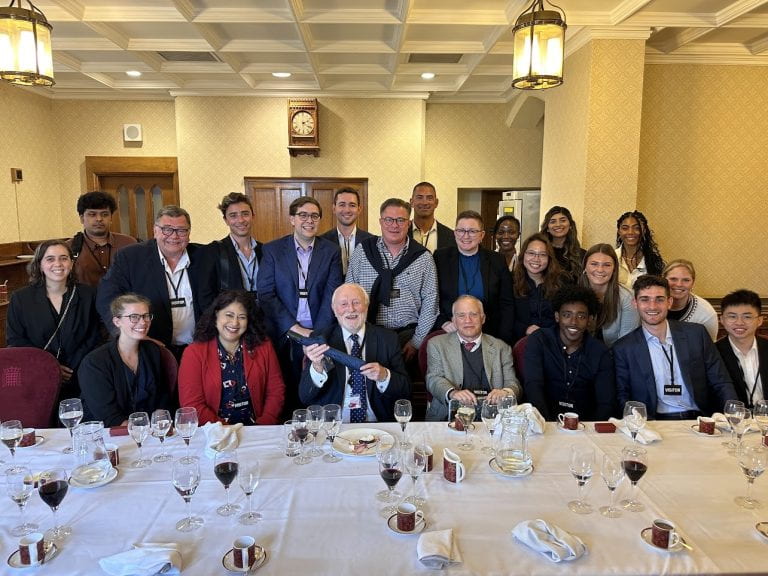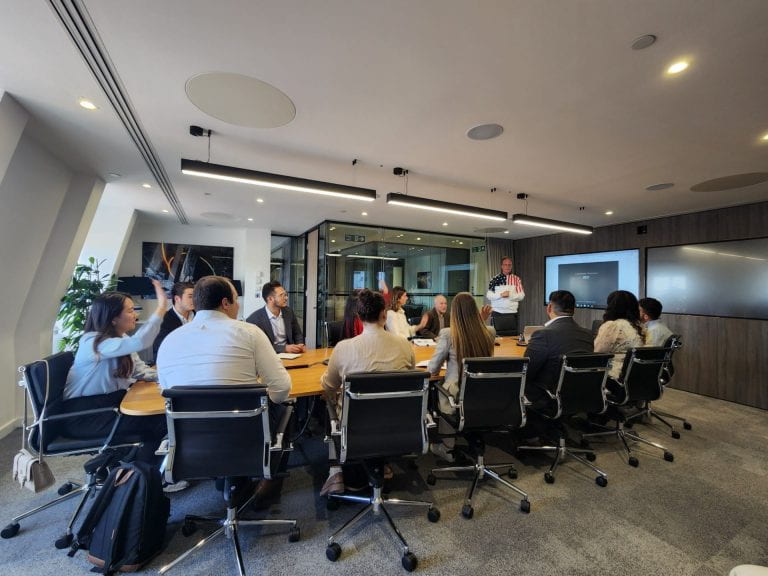Tag: G&EE
Reflecting on Denmark
By Federico Patino
Spring 2024
As I settle back into life in the U.S., I feel extremely grateful for having had this opportunity which completely changed my perspective on sustainability and opened my eyes to new horizons. The program gave me the opportunity to learn from top professionals in the sustainability field and to go on a field trip to a wind farm.
Denmark is a great country for a study abroad program. Copenhagen is a safe city, it's easy to get around, everybody speaks English and the culture is similar to the United States, so settling in is easy. The Copenhagen Business School has a series of campuses throughout the city. Dalvas Have, the campus where our program took place, combines modem classrooms with contemporary architecture that comes across as very Nordic. The school feels similar to a U.S. school, but yet also very different. CBS lives up to its reputation of being one of the best business schools in Europe.

My biggest takeaway from this experience is how different the European perspective on sustainability is to the American perspective. Here in the United States, sustainability is almost an after thought with very few regulations in place to force companies to be more successful. Europeans have a big sense of urgency when it comes to global warming, in part because Europe is a net importer of energy, while the United States is self-reliable. However, the effects of global warming will harm all of us, regardless of whether we live in a country that produces its own energy or not.
Taking the class made me aware of the importance of pushing U.S. lawmakers to implement more regulations so that companies become more sustainable. If the United States does not implement regulations, it might soon be too late to actually do anything about global warming. The United States should follow Europe's example and push forward regulations that promote sustainable practices.

Diversity as Experiential Teacher
Featured in the above photo: Lunch and conversation with Lord Neil Kinnock in the House of Lords Dining Room.
By Olivia Lacny (PMBA '23)
One of my biggest regrets from my undergraduate years is that I didn’t study abroad. My friends would come back from a semester in Paris, a summer in Valencia, or a month in Nicaragua with memories and a whole new world perspective that I envied. I knew at the time that my financial situation could not support an extended time abroad and I did not yet have the confidence to travel alone. Still, it bothered me that I hadn’t taken the opportunity to revel in the mélange of culture and academia. I made my peace with that fact, accepting that the time in my life for living abroad had passed.

Lunch at country inn in Winchester, author left foreground.
Having experienced graduate school in my late twenties, I knew that the lessons I gleaned from academia were more meaningful than when I was in my late teens/early twenties. I feel that having waited until grad school to “study abroad”, this sentiment holds true. The timing is right. I remember snickering at my friends who returned to America feeling “cultured” and “worldly”, as if 16 weeks in a different country could alter your world view. I understand it now. Just six days in the United Kingdom has changed my outlook on climate change, work-life balance, and the impact policy has on public health outcomes.
Most of this is due to the interactions that we had with the different spheres of expertise, but I would be remiss if I thought my classmates didn’t also play into this perspective shift. I thought that after this trip I would have gotten my “study abroad fix”, but I want to live an extended time abroad now more than ever. This is just the beginning and as a prepare to enter my thirties, I’m open to the opportunity of moving outside of the United States. Mortgage, dog, and homelife aside, this trip has taught me the importance of immersion in a different culture.
What I Learned from My Peers
This experience wouldn’t have altered my perspective, had it been a class of 20, like-minded MBA students. One of the most invaluable attributes of this course is that I was surrounded by people who chartered a different path in academia. I learned almost as much from the questions that others asked, as I learned from the keynote speakers. For instance, some of my classmates had an impressive background in environmental policy. Every time that they asked a question about climate policies, I would find myself amazed by their expertise in the field. I felt this with almost all my classmates from different programs. At dinner our first night, a couple of my classmates spent 25 minutes talking about the Jones Act as it relates to the Coast Guard and the supply chain. Did I have any clue what the Jones Act was? No, but I do now! The smaller, informal interactions with my peers proved to be as meaningful and informative as our formal interactions.
General Observations
Learnings from the trip fall into two categories: 1) dialogue and perspective from our speakers and 2) cultural aspects of living in the UK. To begin with the content of our speaker series, one of the most striking aspects of our dialogue was that regardless of industry, businesspeople and policy makers have made a conscious effort to incorporate sustainability into their strategy. The most surprising, was that however conservative Liam Fox is, he is actively aware of the consequences of climate change. Both sides of the aisle agree that this is a world crisis. This is a stark contrast from the American conservative parties who refuse to acknowledge the legitimacy of climate change.
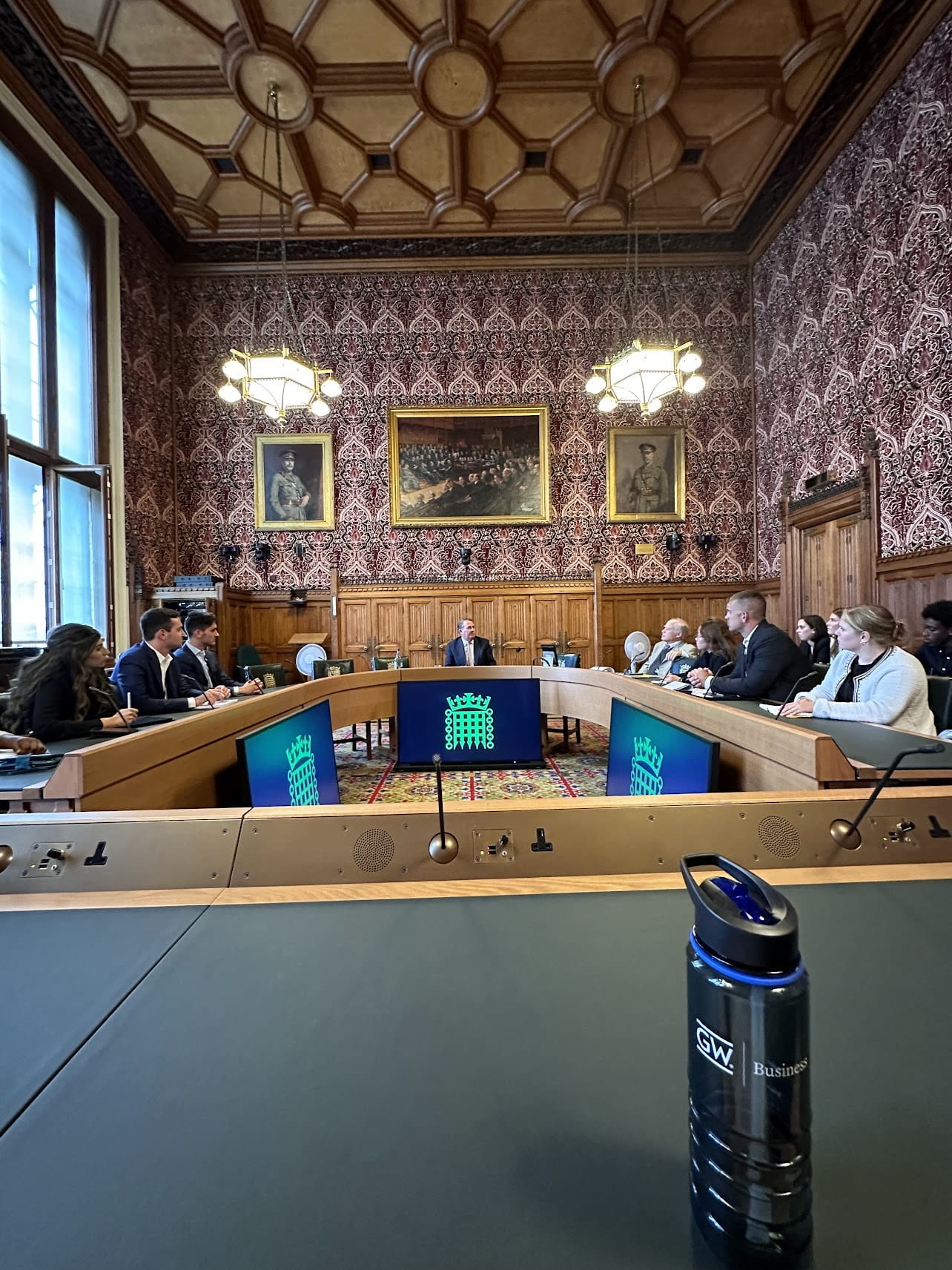
Liam Fox speaking with STAP UK participants.
Culturally, it’s obvious that Brits spend more time thinking about current international events compared to how often Americans think about global happenings. Could it be because Brexit was only a few years ago, and the fallout from leaving the EU has dominated the news ever since? Maybe. On the train a man and his son (who was probably around 7 or 8 years old) sat down across from me. The son asked a question that prompted his father to respond with his thoughts on the US’s national debt. The reverse situation would never happen in the US! I doubt American third graders are keen to discuss other countries’ national debt. This was also a theme of my conversations at the Alumni event. Expats explained how they spent their weekends and I realized how easy it is to immerse yourself in a dozen different cultures. You can easily take a weekend trip to Paris, Berlin, Madrid, Rome (the list goes on)- where the language, food, fashion, and traditions are all wildly different than London. In the US we have the option of traveling across the US or to Canada all of which are similar. Mexico is the only country within somewhat close proximity in which you can experience a different culture.
Core Memories
I’ve created so many wonderful memories, it’s hard to decide on my favorite part of the trip. I enjoyed seeing Winchester and its remarkable cathedral and Cambridge with its medieval charm. Never again in my life, will I have the opportunity to speak with MPs in the House of Commons, or dine with a real-life Lord. As much as I would love to do a graduate program abroad, I will probably never have another opportunity to study economics at Cambridge.

Global Head of Infrastructure, Government and Healthcare Richard Threlfall with UK STAP group at KPMG Headquarters, Canary Wharf.
My favorite speakers included MP Carolyn Harris and Richard Threlfall from KPMG. Both had a contagious enthusiasm for their work. As a consultant, I appreciated learning about consulting in a different industry. I loved Richard’s “primer” activity asking questions like “what would happen 6 years & 26 days from today?”. It felt like a game of trivia, which was a welcome change after a long day of meetings.
Carolyn Harris did not fit my perception of an MP. It was empowering to hear that someone with a working-class background and purple hair could become an MP, and that you don’t need to fit the classic mold of a “politician” in order to be one in the UK. This is different from politicians in the US, where it is almost impossible to become a representative without copious amounts of money and fashion conformity.
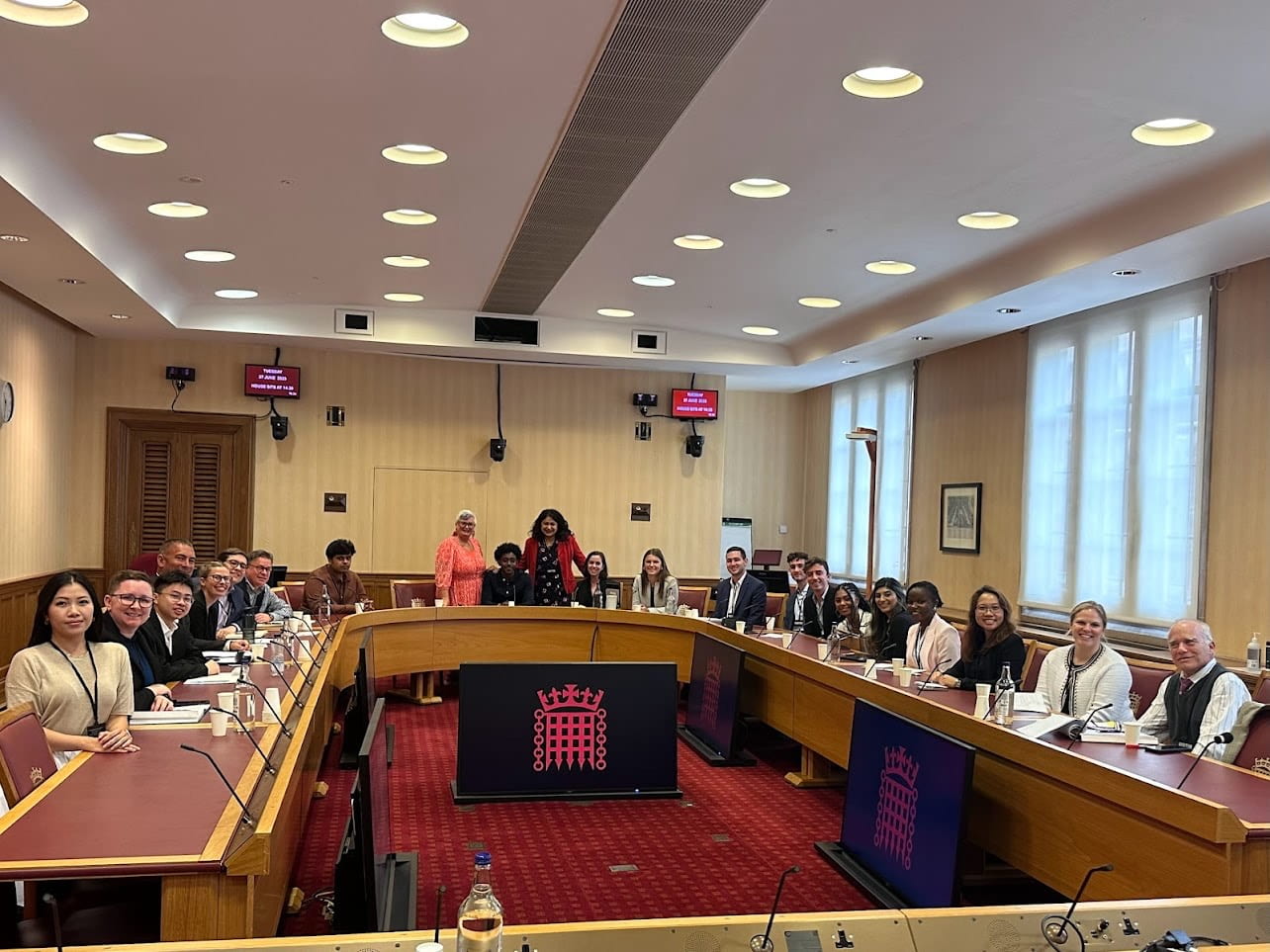
STAP UK 2023 participants in Parliament with MP Carolyn Harris and Councillor Aysha Raza
Carolyn spoke with such passion on the concept of women’s health and menopause, it reinvigorated the same passion that I once had while studying in undergrad. When Carolyn said that she would let us know when she was on Capitol Hill, I would ACTUALLY want to see her! She was a refreshing personality in a somewhat stuffy parliament building.
Conclusion
I am grateful to have had the opportunity to participate in this program. It exceeded my expectations and pushed me to learn and explore academic disciplines other than my own. The itinerary was perfectly organized and executed and with each new guest speaker I felt more excited. I used to poke fun at my friends who said study abroad “changed their life”, and while I’m the same person that I was before London, I will cherish the memories I created through this once-in-a-lifetime experience.
For Profit or for Progress
Featured in the above photo: STAP UK Participants with Long Harbour speaker, Christophe de Taurines, BBA 1986.
By Cassie Nestor (MA International Economic Policy '23)
Visiting London, I was able to see the benefits and shortcomings of private and public ownership. Studying economics, I am accustomed to focusing on the most efficient outcomes. However, this program forced me to challenge what efficiency looks like, reexamine where different comparative advantages exist, and appreciate the need to be flexible in creating solutions with well-defined and explicit goals. There is an opportunity cost to every decision. In focusing on private sector ownership, England forgoes public sector ownership and its affinity towards social progress. In choosing public sector ownership, England forgoes private sector ownership and its profit seeking behavior that leads to the efficient use of resources and lower prices for consumers. Business and the State in London: Privatization, Nationalization, and Public-Private Partnerships exposed the tensions between the private and public sectors and the need to strike a balance between the two in such a way that neither progress nor profit are compromised.
During this program, I was unsure that the competing goals of the public and private sectors would ever exist in cohesion and that maybe progress and profit should not mix. This notion was solidified by our first visit to Long Harbour and our discussion with Senior Advisor Christophe de Taurines. His most striking comment was when he indicated that social change is not part of their model, and that the real estate firm is unable to profit on certain people. Businesses must meet their bottom line. While disheartening, that is a reality faced by all firms; if an activity is generating a loss, the rational choice is to discontinue operations. But what was unsaid is that discontinuing operations meant that some groups were left without access to housing and other goods. These decisions often hurt the most vulnerable in a society. If left only to the private sector, poor and disadvantaged individuals would continue to have less because they are not seen as a lucrative business opportunity.

Global Head of Infrastructure, Government and Healthcare Richard Threlfall with UK STAP group at KPMG Headquarters, Canary Wharf.
The dichotomy of the motives between the public and private sectors was illustrated by Richard Threlfall, Global Head of Infrastructure, Government, and Healthcare at KPMG. It was during this visit that we took a macro approach to major questions and events happening in the world. Unlike Taurines, who emphasized the need to make profit, Threlfall emphasized the need for larger states and larger players to cover the costs incurred by developing countries as they make important decisions to meet their development goals.
While discussed at the international level, the same is true at the national level. Governments are able to reach households and communities that are overlooked by the private sector and absorb the costs of providing goods and services to unprofitable communities in the name of social progress. However, when governments choose to engage in these activities, their balance sheets grow at an accelerated and dangerous rate.
Public ownership presents its own challenges. After talking to doctors in the National Health Service (NHS), different politicians, and members of the local community, I learned that public ownership has caused health care in England to be slightly underproductive. We became aware of inefficiencies such as the long wait times and underfunding. These issues have become so prevalent that there has been a push to privatize parts of the NHS to ensure that it is able to meet the needs of the people. There is a gap that exists between the market outcome and the social outcome. This gap leaves space for the rise of private public partnerships and their keen ability to balance the need to make profit and the need to prioritize social progress.

STAP UK 2023 participants at NHS Great Ormand Street Hospital with Dr. Daljit Hothi, Associate Medical Director.
Public private partnerships are still very experimental, with each union leading to a unique outcome and a set of lessons learned. After listening to the speakers, I have come to accept that a happy medium between private and public ownership has yet to be discovered. This course helped me realize that while the “perfect balance” between private and public ownership will vary across industry and consumer needs, we should not be discouraged from trying. It is only then that society will achieve both progress and profit.
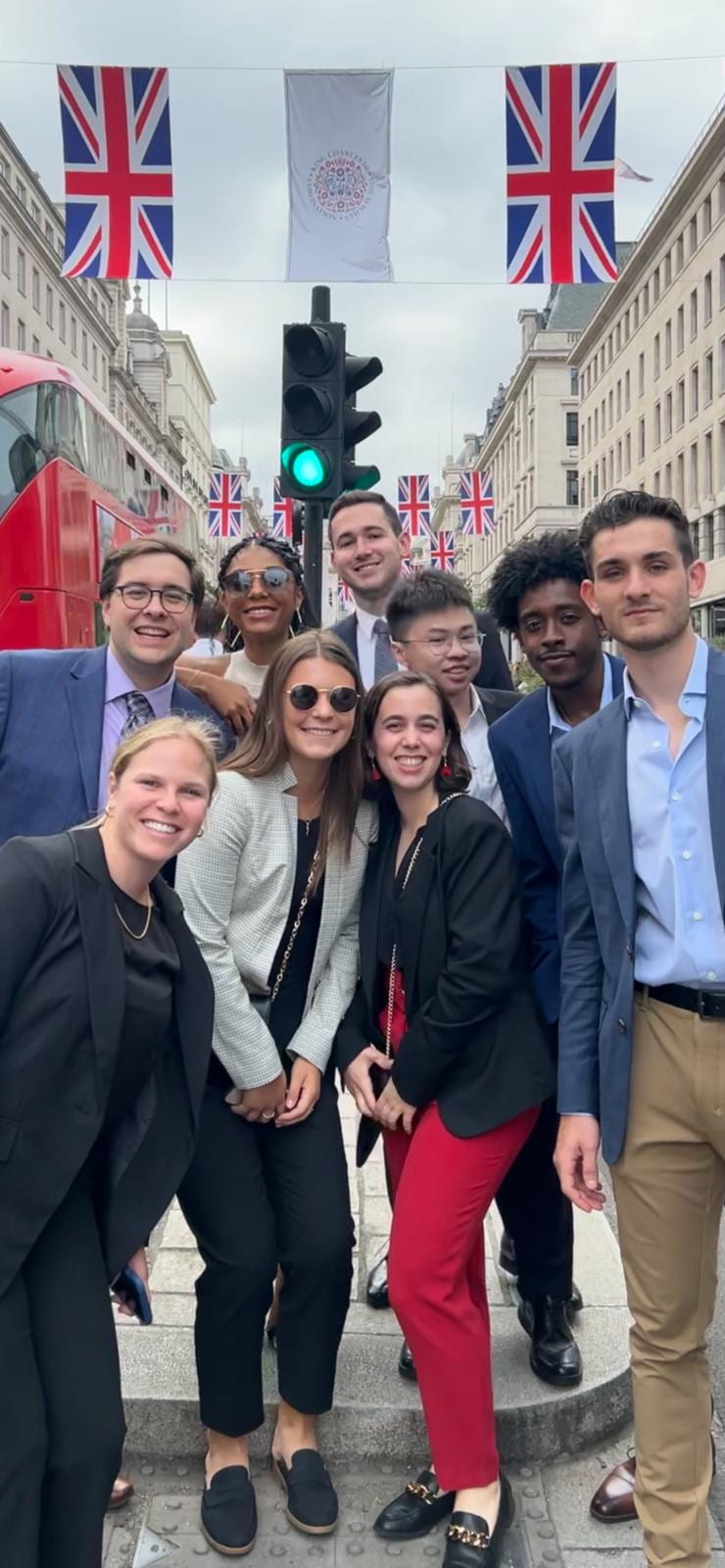
STAP UK participants on their way to the GWU UK Alumni Networking Event.
The most beneficial aspect of this program was the knowledge received from my peers. It is easy to become siloed in one school of thought. Every tool we have to understand the world is flawed because every academic discipline emphasizes and ignores different variables that would otherwise have a significant impact on the way that we answer different questions. In staying in our traditional paradigms, we lose the possibility of asking and answering new and complex questions. However, with classmates across different schools and professional backgrounds, ideas that I would not normally come across in my classes became major topics of discussions. These questions pushed me out of my comfort zone and helped me grow intellectually. Together, my classmates and I were able to pool our knowledge and catch many of our speakers by surprise with the complexity of our questions.
Now having a slightly stronger working knowledge of different topics such as healthcare and climate change, two very salient topics in both the US and the UK, I am better equipped to answer complex questions that require unconventional solutions.
Studying international economic policy, I have been fortunate enough to be part of a program that allows me to have a foot in both the world of policy through the Elliott School of International Affairs and the world of business through GWSB. By taking classes that span across both fields, I have been able to generate a dynamic understanding of the nexus between business and politics which would have been absent if I was not encouraged to take classes and learn the importance of balancing the priorities of business executives and elected officials.
The most important lesson I will hold on to is that the private and public sectors need the other to succeed, and the success of both sectors will benefit the consumer. A strong private sector needs a strong public sector to set the rules of the road in terms of regulations and promote fair competition. A strong public sector needs a strong private sector to spur innovation, job creation, and economic growth.
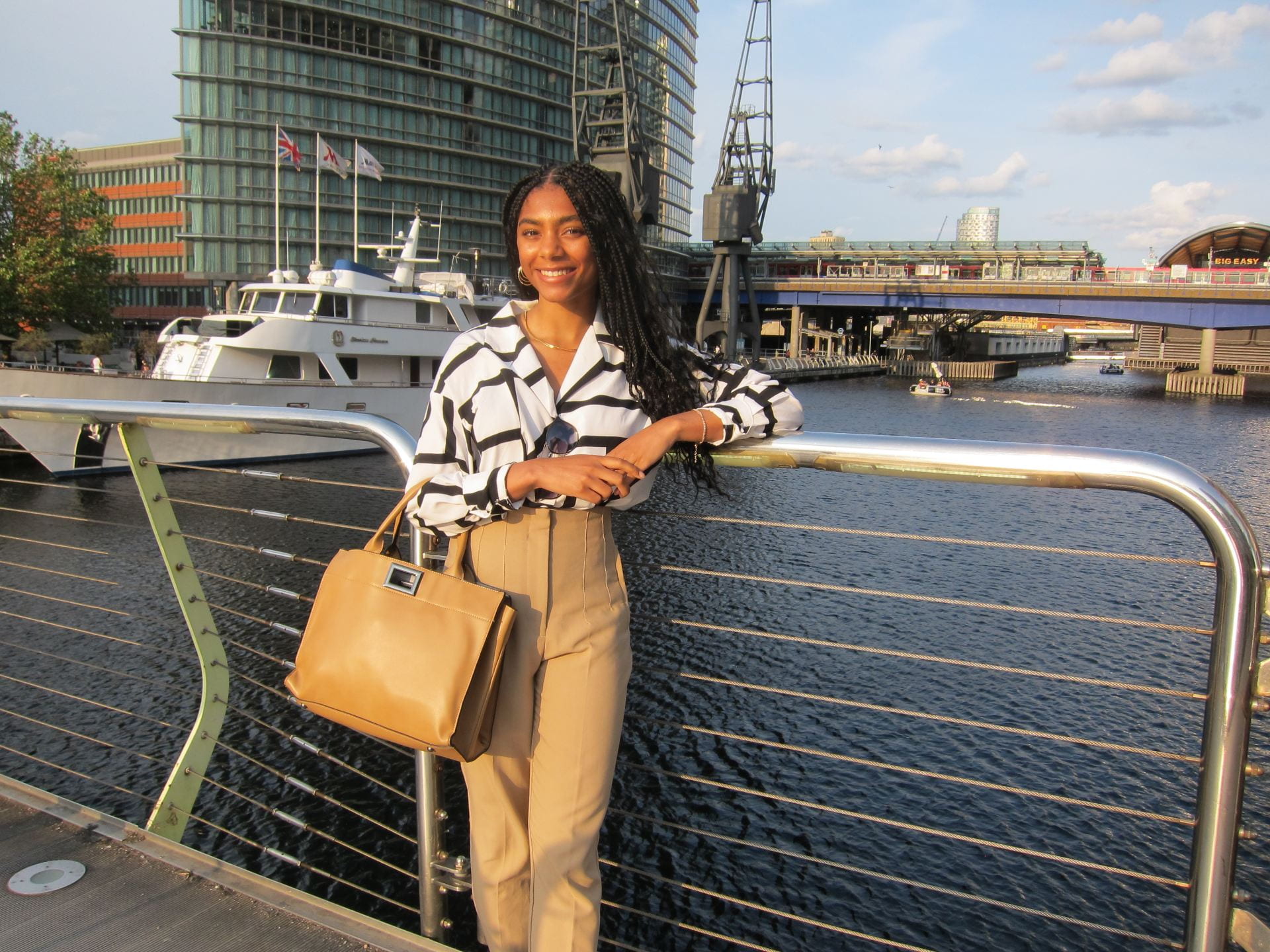
The author with the River Thames in the background.
When both entities are in concert, the consumer feels empowered to participate in the economy and take responsible economic risks which will contribute to widespread prosperity. Business and the State in London is a well-designed combination of business and politics and will leave a lasting impression on my professional career.


